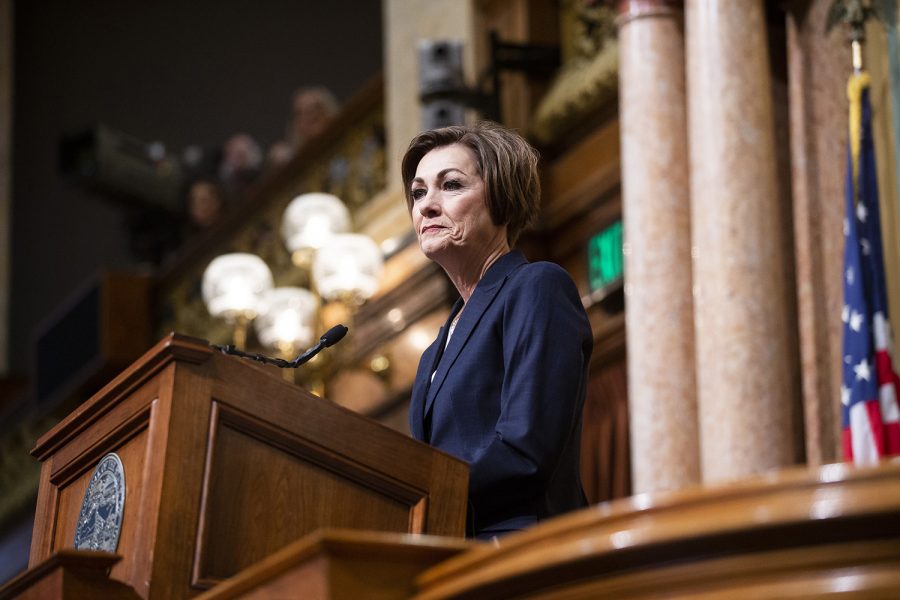Reynolds signs executive order restoring felon voting rights
Gov. Reynolds signed an executive order restoring felon voting rights on Wednesday morning. Iowa is the last state in the nation to give felons who have completed their sentence the right to vote.
Gov. Kim Reynolds speaks during the Condition of the State address at the Iowa State Capitol on Tuesday, January 14, 2020.
August 5, 2020
After months of protesting in Des Moines and calls from activists across Iowa, Gov. Kim Reynolds signed an executive order restoring voting rights for felons who have completed their sentence.
Iowa is the last state in the nation to restore voting rights to felons. In 2005, Gov. Tom Vilsack signed an executive order restoring voting rights to felons, which was later reversed by Gov. Terry Branstad in 2011.
The order does not automatically restore voting rights to felons convicted of murder, manslaughter, and serious sexual crimes.
Felons are not required to have finished paying restitution to victims in order to be eligible to vote.
“That creates the potential for uneven justice. It means people who have served their sentence and are seeking to get their lives back on track permanently are prohibited from one of the most basic rights of citizenship unless a single individual decides otherwise,” Reynolds said at a press conference where she signed the order.
2.2 percent of Iowans — more than 60,000 people — were disenfranchised felons in 2016, according to The Sentencing Project. 9.8 percent of Black Iowans were ineligible to vote in 2016, according to the report.
“We cannot ignore how negatively and significantly the current process has impacted the lives of so many Iowans of color,” Reynolds said.
Reynolds was joined by Betty Andrews, president of the Iowa-Nebraska NAACP, and Rep. Ako Abdul-Samad of Des Moines, among others. No Des Moines Black Lives Matter activists, who originally met with Reynolds about the order in June and have repeatedly called for the order to be signed, were present at the signing of the executive order.
Reynolds said she was keeping the signing to a small group, but planned to hold a larger celebration of the order in October.
Reynolds said she did not intend for the order to be a permanent solution, and said the legislature should work to amend the Iowa constitution to permanently allow felons to regain their right to vote.
“Today we are taking a step to at least temporarily fix that injustice that our current system creates,” Reynolds said. “But let me be clear, an executive order, is at best, a temporary solution.”
Abdul-Samad spoke after Reynolds signed the bill, wearing a T-shirt bearing an image of the late Congressman John Lewis.
“It’s imperative that we get this done. It’s imperative for the rights of everyone to be able to vote. This comes at a time, where it is seriously a tribute to the legacy of Congressman Lewis,” Abdul-Samad said.
Andrews said the NAACP has been working to restore rights since the original order was revoked in 2011.
“We do want to thank you for answering the call – this is extremely important. The right to vote is a fundamental act of citizenship,” she said.
Matthew Bruce, an activist with Des Moines Black Lives Matter, said in an interview with The Daily Iowan that he was glad to see that restitution payments were not required for voting rights to be restored, which would have been required in a bill proposed by the Iowa Legislature earlier this year.
Bruce said that activism in Des Moines was successful in holding Reynolds accountable, and that the signing of the order showed the effectiveness of protesting.
“It’s just a moral victory, and it also shows people that when you take your feet to the street, things do change,” he said. “It’s not something you do just to feel better or whatever, we really are changing people ‘s lives.”



